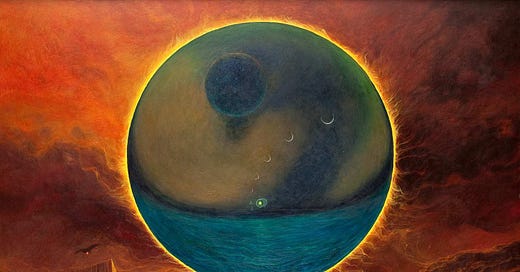After the first death, there is no other
On Dylan Thomas's refusal to mourn the death of a child
How do you mourn a little girl burned to death by bombs? Dylan Thomas’s answer was: you do not.
We will never know precisely which of 5,184 children killed by the Nazi bombardment of London inspired his strange, enigmatic poem. But the Welshman must have been haunted by some particular death. A Refusal to Mourn the Death, by Fire, of a Child in London, written in the wake of WWII, attests to the weight of one man’s attempt to face down the unthinkable.
The poem opens in an almost mystical register. Not until the fathering and all humbling darkness extinguishes the last light breaking, writes Thomas — not until the still hour / is come of the sea tumbling in harness — will the poet bring himself mourn this immolated girl. Not, therefore, before the end of the world itself, will Thomas lament the majesty and burning of the child's death. Until then, he swears:
I shall not murder
The mankind of her going with a grave truth
Nor blaspheme down the stations of the breath
With any further
Elegy of innocence and youth.
Why does the poet withhold his elegies? We approach the end of the poem with a disconcerting image of the burned child, returned to the earth itself. Deep with the first dead lies London’s daughter / robed in the long friends. And so on. Then we are offered eight words to close out the poem.
After the first death, there is no other.
This is why any expression of grief would be tantamount to sacrilege — as Thomas puts it, to blasphemy. Even one death permanently alters the world. Even one death is a radical evil no human is capable of fully registering. We would be equal to that act of mourning only when the all humbling darkness breaks over last light. Only when the sea itself is stilled.
Dylan Thomas saw correctly. A child’s death by fire cannot rightly be matched by sympathy or even grief. It is something far more terrible. Thomas writes of the majesty and burning of the child’s death, something unapproachable in its power. That death does not mark a mere loss of innocence and youth, but a permanent claim on our view of the world. To mark just one death is to mark it with cosmic grandeur, excluding all other claims to your attention and moral concern. There is no other.
And all that for one child burned to death by the bombs of genocidal fascists. What to say of 13,000 children killed just so?1 Where my tears turn to blasphemies, where my words would be a further murder, I must hope that the darkness of a dead universe, that a sea gone frozen, waves stiff as battlefield corpses, can pay the only possible tribute to the dead of Gaza. No words I write could ever be their equal.
I do not use these terms for shock effect. Netanyahu’s finance minister Bezalel Smotrich describes himself a “fascist homophobe”. Former prime ministers Ehud Barak and Ehud Olmert, as well as former IDF chief of staff Moshe Ya’alon, have also described Israel’s current government as fascist. The same warning came from the late Zeev Sternhell, one of the world’s foremost experts on fascism, who warned in 2018 of Israel’s “growing fascism and a racism akin to early Nazism.” As for the genocidal nature of Israel’s destruction of the Palestinians, that is beyond dispute.




